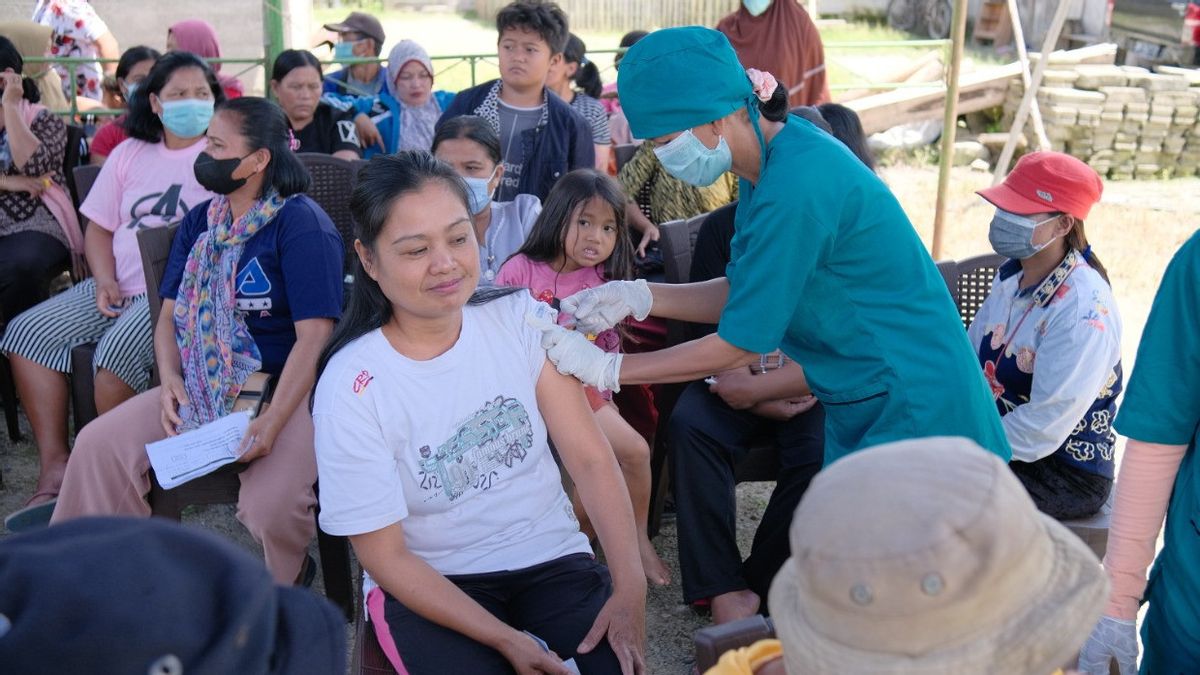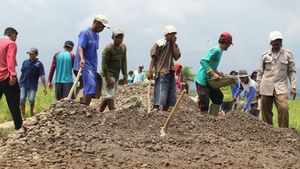JAKARTA - The COVID-19 pandemic has increased again in recent days. Although the number of vaccine recipients continues to grow and its coverage is widespread, the emergence of new subvariants threatens again. In the latest development, the government announced the circulation of XBB subvariants from Omicron in Indonesia on Wednesday (26/10). Then, as of Saturday (5/11), at least 12 subvariant cases were recorded.
Reflecting on cases in Singapore, this subvariant attacks many young people with an age range of 20-39, according to the Executive Board of the Indonesian Doctors Association (PB IDI). Not only that, those who have never been exposed to COVID-19 are actually more at risk of being infected with XBB. IDI recommendations do not change: health procedures apply strictly, and the third dose of vaccination aka booster must be accelerated.
In the same form of consideration, the Civil Society Coalition for Access to Vaccination for Indigenous Peoples and Vulnerable Groups assesses that vaccination needs to be intensified up to a booster, especially for indigenous peoples and vulnerable groups. This is because these two groups generally just received the second dose of vaccine. In line with IDI's recommendations, the Coalition also recommends that people continue to apply strict health procedures and receive a booster immediately.
This boost is based. Since the end of October, the daily number of COVID-19 cases has increased dramatically. In the past week, the trend of COVID-19 cases has still shown an increase. On October 31, the transmission rate was 2,457, then rose to 4,707 a day later. The increase did not stop until November 4, and reached the level of 5,303. Obscenity only lasted two days after cases fell to 3,662. However, on November 8, cases rose to 6,601, and November 9, 6,186.
It is not yet certain whether the XBB subvariant contributed to the spike in cases. Even so, the recent increase in cases is certainly a concern.
The Coalition Coordinator, Hamid Abidin, stated that the booster giving could not be postponed any longer. In addition, the implementation of health procedures must also remain strict and supervised. Vigilance needs to be maintained, because COVID-19 is not completely gone.
Hamid also emphasized that the government needs to continue to support and facilitate indigenous peoples and vulnerable groups in remote areas outside Java. There are still quite a number of those who have not received the first and second doses of the COVID-19 vaccine. They certainly can't get a booster vaccine if they haven't received the doses 1 and 2, he said. Important vaccinations in an effort to protect against transmission and death due to COVID-19. According to a statement by the Minister of Health, 84 percent of victims who died from COVID-19 had not received a booster.
If these two vulnerable groups get a booster, Hamid believes the XBB subvariant can be driven to spread remote areas or attack vulnerable groups. Because, so far, these two groups are still left behind for the general dose of vaccine. If they get new subvariants, Indonesia will be free from COVID-19 more and more," he said.
The booster vaccine can boost the effectiveness of vaccines I and II because the double vaccine's workforce can weaken over time. Weakening body protection bulwarks requires booster intervention so that antibodies can be re-formed optimally. When immunity has increased, the body will be better prepared to deal with the virus.
According to Maulani A Rotinsulu, Chairman of the Indonesian Women's Association of Disabilities (HWDI), the provision of booster vaccines needs to be encouraged among people with disabilities. The reason is, so far they cannot access vaccines actively like the general public. By comparison, the recipients of boosters to the general public as of November 9 are 65.58 million or 27.95 percent of the 234.66 million targets. Givings can be done by picking up the ball or cooperating with people with disabilities," he said.
By involving communities of people with disabilities, families or guides of people with disabilities can participate in communicating the importance of carrying out health procedures among people with disabilities. This involvement can also take the form of disseminating information about boosters. This is to respond to the fact that people with disabilities have difficulty accessing information according to their conditions. In fact, some consider their condition to be comorbid so they feel there is no need for vaccination. Community involvement is expected to increase literacy about vaccines and COVID-19 among people with disabilities.
In indigenous peoples or in remote areas, literacy about vaccines is also still weak. Gita Syahrani, Head of the Lestari Regency Gathering Secretariat (LTKL), explained that not everyone in remote areas is ready to be vaccinated because of the lack of education. Generally they do not understand about COVID-19 and its vaccines. They are afraid because they are influenced by hoaxes that are scattered," said Gita. For this reason, LTKL cooperates with teachers, traditional or religious leaders, as well as related agencies to help the vaccination program.
LTKL also takes an approach that is in line with the lives of indigenous peoples. For example, to increase immunity requires clean living behavior and sufficient food. "This nutritious food adequacy can be fulfilled from the gardens they have planted themselves," he said.
Another problem is the distribution of vaccines. Access to transportation to remote areas is not as easy as it can be reached in urban areas with adequate infrastructure. Ensuring the vaccine arrives at its destination is a problem in itself. Empakan Village, Kayan Hulu District, Sintang Regency, West Kalimantan Province, can be an example. To achieve this village, the vaccination team from the district must use a boat to travel the river for up to 2 hours.
LTKL's achievement is to help provide vaccines to indigenous peoples in seven districts with eight thousand doses. The seven districts: Banyuasin (South Sumatra), Sanggau, Sintang, Kapuas Hulu (West Kalimantan), Sigi (Central Sulawesi), and Gorontalo and Bone Bolango (Gorontalo).
Epidemiologist and researcher from Griffith University, Australia, dr. Dicky Budiman, M.Sc.PH, explained that the XBB subvariant is dangerous because it infects the community when their conditions are vulnerable. The context is that most of the population has not received a booster. Moreover, children under the age of 6 should not be vaccinated at all. The booster vaccine is still a PR because it has not been implemented adequately, stuck at 27 percent. This is dangerous. Especially the risk in vulnerable groups," said Dicky.
He considered the booster to be boosted. This is because the XBB subvariant appears amidst the increasingly eroded capital immunity.
He suspects that the increase in the death rate is likely to be triggered by XBB cases. This subvariant has the ability to infect and break through body defenses that have been formed by vaccinations and previous infections.
The concern has increased because this XBB subvariant attacks young people, even those who have contracted COVID-19 twice. If so, their condition is more vulnerable because it is like comorbidities or the elderly whose immune system has decreased. When the immunity capital achieved with the booster is delayed, it is possible that the death rate could be higher," he said.
For this reason, Dicky advised the government and the public to be vigilant. The 3 T method must be encouraged again: testing (finding cases of infection), tracing (tracing cases), and treatment (following up on the infected). The public must also return to implement strict health procedures.
As a result, if you want the pandemic to end quickly, you need consistent handling and equal response for all regions. If this is not the case, the virus must be free to infect and quickly adapt to the handling that has been carried out. Due to the existence of this XBB subvariant, it will depend on how much coverage of the vaccination (booster) is protective in the community," he said. But, if you continue to ignore it and health procedures are relaxed and the modal immunity is not achieved, the end of the pandemic can back down. It could even appear bad things, the birth of other variants," he said.
The English, Chinese, Japanese, Arabic, and French versions are automatically generated by the AI. So there may still be inaccuracies in translating, please always see Indonesian as our main language. (system supported by DigitalSiber.id)













